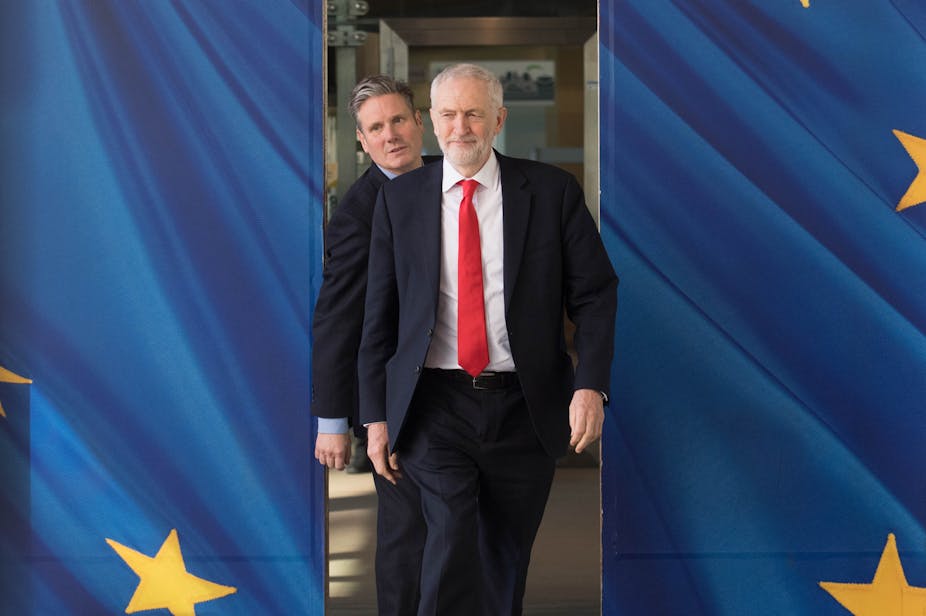Since Labour’s devastating defeat in the general election, two rival explanations have been offered by those inside the party. For left-wing supporters of outgoing leader Jeremy Corbyn, Brexit was to blame. The policy of promising a second referendum, foisted on the leader by centrist Remainers, alienated pro-Brexit working-class Labour voters in the Midlands and the north of England. Their defection to Boris Johnson’s Conservatives or to Nigel Farage’s Brexit Party massively depressed Labour’s vote in these so-called red-wall constituencies, paving the way for a Conservative victory.
Centrists, meanwhile, blame Corbyn personally for the defeat. His approval ratings were dire and he acted as a drag on Labour’s support. His past associations with questionable causes and perceived lack of patriotism offended traditional Labour supporters. He oversaw a sharp shift to the left, promising largescale nationalisation that daunted many people. His manifesto also came in for criticism for offering a seemingly endless series of giveaways to voters, with little indication of where the money would come from to pay for them.
In truth, there is no need to choose between these accounts. Both are largely correct. Running a second referendum would effectively cancel the result of the first and that was always likely to enrage Leavers. It stopped being a question about Brexit and became one about whether politicians had to implement the results of popular votes.
Some centrists warned Corbyn’s fudged position on Brexit – winning an election and negotiating his own deal with the EU – was driving voters to the Liberal Democrats. Yet most of Labour’s pro-Remain strongholds were in metropolitan areas where it enjoyed huge majorities (51 of the seats Labour was defending had majorities of over 45%, mainly in cities such as London, Liverpool, Manchester and Birmingham). Few of these would have fallen to the Lib Dems. The smaller majorities Labour was defending in pro-Brexit rural and small-town constituencies of the “red wall” were much more vulnerable to a swing to the Conservatives.
The centrists are correct, however, to pinpoint the huge importance of leadership in modern elections. Given the policymaking and patronage power of the prime minister, it matters greatly who holds this role. Voters will take a keen interest in the character of a person seeking to hold this position. While Johnson presented plenty of problems on this front, what really mattered were his weaknesses relative to those of his main opponent, Corbyn. It is extremely difficult for parties to win elections nowadays if their leaders trail far behind their main rivals for the top job.
Similarly, on economic policy, the Corbynites’ insistence that their left-wing manifesto was popular with voters is overly simplistic. When people are asked whether they want free things, whether they are university tuition or broadband, most will say yes. But a manifesto must hang together as a whole and add up properly. Voters were unconvinced that a Corbyn government could afford to provide the things it promised and suspected it would end up taxing, spending and borrowing too much.
The quest for economic credibility will be an essential task for the next Labour leader. That won’t necessarily have to mean adopting the pro-market policies of the Blair years. There is a desire for government intervention, well-funded public services and redistribution among voters – including those who deserted Labour – but they need to be convinced that everything is affordable and budgeted for, which includes not frightening off investors. Otherwise voters will fear economic catastrophe and withhold their support.
Choices ahead
The fact that both the left and the centrists have correctly diagnosed one cause of Labour’s defeat respectively, but both have presented them as rival explanations, indicates that whichever side wins control of the party after Corbyn, problems will remain. The preferences of Labour’s 500,000 members, who will choose the new leader, may amplify these problems. Members got what they wanted from the manifesto: a left-wing economic programme and a pledge to hold a second referendum. Leadership candidates may feel they need to accommodate these preferences to have any chance of winning. Left-wingers such as Rebecca Long-Bailey are likely to be ideologically more in tune with the membership. Centrists, such as Keir Starmer, the party’s Brexit spokesman, have already started to defend Labour’s radical left-wing agenda. But if the contest to replace Corbyn produces another left-wing leader, it becomes more likely that a split will come, as centrists decide that Labour is lost and unelectable.
Labour’s centrists were undermined in the last parliament by their divisions over Brexit. With the completion of Brexit next year, that should no longer be a problem. However, Labour – and indeed, social-democratic parties across Europe – face a broader difficulty in winning back the support of working-class voters. Brexit came to symbolise the division within Labour’s electoral coalition on questions of culture, identity and morals, often grouped under the heading of “identity politics”. Liberal-left positions on diversity, immigration and European integration, as well as areas such as criminal justice, security and human rights, are appealing to middle-class professionals and students, but often grate with the social conservatism of traditional working-class communities.
This is a problem for whoever becomes Labour’s next leader, and if there is a split, any new social-democratic party will face the same dilemma. It should be recalled that, whatever their other differences, Blairites and Corbynites are both tribes of Islington. Each signs up instinctively to the liberal left’s socio-cultural agenda and each would be highly resistant to changing position.
Political scientist Matthew Goodwin has noted that it is easier for conservative politicians such as Boris Johnson to shift a bit to the left on economics than it is for social democrats to shift a bit to the right on identity and culture. Yet Labour will struggle to win if it simply abandons its traditional supporters. Getting Brexit done will remove a major symptom of Labour’s disconnect with working-class voters, but it will not remove the underlying cause.

